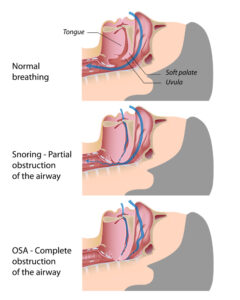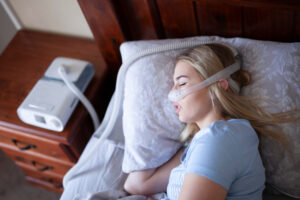Should I Be Concerned about My Partner’s Loud Snoring?
 Snoring can be much more than just a nuisance or interruption of sleep. If you or a loved one snore consistently, you should investigate. Snoring could be a sign of a dangerous sleep condition known as sleep apnea. Treating a snoring problem doesn’t just make your partner happy; it could improve your overall health!
Snoring can be much more than just a nuisance or interruption of sleep. If you or a loved one snore consistently, you should investigate. Snoring could be a sign of a dangerous sleep condition known as sleep apnea. Treating a snoring problem doesn’t just make your partner happy; it could improve your overall health!
What Causes Snoring?
Snoring is a sound created during sleep by loose tissues in the mouth and throat. As someone breathes in and out, these tissues flap against one another, causing the sounds of snoring. Snoring ranges from light wheezing sounds to very loud snorts.
Some people who snore also make sounds like they are gasping for breath periodically. You should never ignore sounds like this!
Snoring might just be simple snoring. However, it could also be a warning sign of obstructive sleep apnea.
What is Obstructive Sleep Apnea (OSA)?
 Obstructive sleep apnea is a condition in which a person stops breathing during sleep due to obstruction of the airway. When you hear “obstruction of the airway”, you might think of choking on some foreign object. It is important to understand that obstruction can occur without a foreign body present, due to natural anatomical structures.
Obstructive sleep apnea is a condition in which a person stops breathing during sleep due to obstruction of the airway. When you hear “obstruction of the airway”, you might think of choking on some foreign object. It is important to understand that obstruction can occur without a foreign body present, due to natural anatomical structures.
Typically, the “obstruction” in OSA is a collapsing of the airway that essentially closes it off. There are several factors that influence the anatomy of the airway. These include the shape, size and position of the jaws as well as the presence of any enlarged tissues in the area (like tonsils and adenoids). Another factor is excess weight in the face and neck that could place additional pressure on the airway from the outside.
Obstructive sleep apnea can occur in varying degrees. Those with mild sleep apnea may only suffer apneic events where they stop breathing a few times every hour. Severe sleep apnea causes lapses in breathing more than thirty times per hour, or at least every other minute. As you might expect, these lapses in breathing deprive the brain of oxygen, and they are NOT good for your overall health.
Why is Sleep Apnea Dangerous?
The decrease in oxygen levels throughout the night caused by sleep apnea adds stress to the human body. Obstructive sleep apnea is linked with high blood pressure, stroke, diabetes, COPD, cancer, and other health conditions. Studies show that until the sleep apnea is under control, it is more difficult for patients to successfully treat these other systemic health problems.
Patients with OSA have more difficulty in losing weight, even with strict diet and exercise regimens. Because the body is under a constant state of stress, it will tend to “hoard” energy stores of fat.
The frequent sleep apnea events also disrupt sleep, preventing patients from achieving deep stages of sleep. These patients suffer from daytime fatigue and have a risk for falling asleep while driving.
Why is This Information on a Dentist’s Website?
You may be wondering why your dentist is talking about a sleep problem. At Designer Smiles, we care about your overall health, and sleep apnea can have a significant negative impact on your health.
There are also two specific reasons we care about sleep apnea: 1) Sleep apnea can cause specific dental problems. 2) One of the most popular treatments for obstructive sleep apnea is a dental appliance. Let’s break these down.
Sleep Apnea’s Dental Problems
Patients with obstructive sleep apnea can exhibit two specific dental problems that are damaging to the teeth. First, these patients often clench or grind their teeth heavily. This leads to a severe wear and tear on the teeth in the form of enamel attrition and cracking.
Secondly, patients with OSA typically suffer from severe acid reflux. This is because the closure of the airway creates a suction effect when the person attempts to breathe. That suction can pull stomach acid up into the esophagus and mouth. Acid reflux causes severe enamel erosion on the teeth.
Sleep Apnea’s Dental Appliance
Dentists can aid in the treatment of mild and moderate sleep apnea by fabricating a specific dental appliance for affected patients. The dental appliance treats sleep apnea by repositioning the lower jaw in order to open the airway. It also helps tighten those loose flappy tissues that cause snoring.
What are the Treatments for Sleep Apnea?
In order to determine the best treatment option for patients with obstructive sleep apnea, the first step is a sleep study with your medical doctor or a sleep physician. This is necessary in order to diagnose the severity of the apnea. The severity of the condition does affect your treatment options.
Positive Airway Pressure Breathing Machines
 The most common treatment offered to patients for all severities of sleep apnea is a CPAP or BiPAP machine. These machines use positive pressure to keep the airway open. To put it bluntly, the blow air into the nose or mouth to force the airway to stay open. While this sounds uncomfortable, many patients achieve great success with CPAP and BiPAP machines. They are the treatment of choice for patients with severe sleep apnea.
The most common treatment offered to patients for all severities of sleep apnea is a CPAP or BiPAP machine. These machines use positive pressure to keep the airway open. To put it bluntly, the blow air into the nose or mouth to force the airway to stay open. While this sounds uncomfortable, many patients achieve great success with CPAP and BiPAP machines. They are the treatment of choice for patients with severe sleep apnea.
Dental Appliances
Working in conjunction with a medical doctor or sleep physician, Dr. Ann can help you obtain an accurate diagnosis for your sleep apnea. If yours is not severe, then you have the option to treat it with a dental appliance. These appliances typically fall under the category of Mandibular Advancement Devices (MADs) because they reposition the lower jaw to pull it slightly forward and open the airway behind the tongue.
Because these appliances must fit the teeth perfectly, and because they have the position to change the way the teeth bite, it is essential that you only undergo this treatment with a dentist’s supervision.
Surgical Techniques
There are a variety of surgical techniques performed by oral and maxillofacial surgeons or ear, nose, and throat specialists to open the airway. One is the removal of excess tissue from the soft palate, and another is the placement of tiny implants into the soft palate to reduce vibration.
A relatively new procedure is the Inspire device, which an ENT implants into the body and stimulates the airway during sleep. It’s like a pacemaker for your airway.
More Questions about Snoring?
Call Designer Smiles today to schedule a consultation with Dr. Ann. She is an expert in the dental treatment options for snoring and obstructive sleep apnea. She will work closely with you and your medical doctor to make sure you receive the best care possible!
